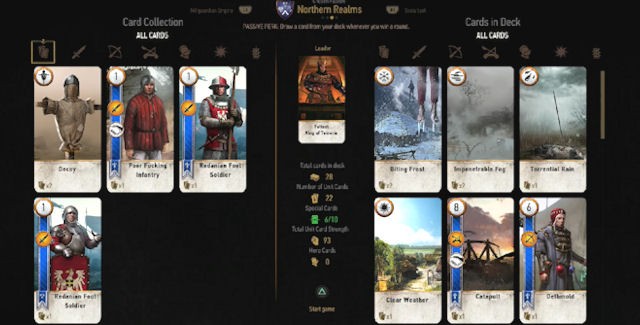
The beauty of an open-world game not only lies in the fact that there's a huge map to explore and traverse, but also in other activities that you can indulge in when you aren't feeling like taking up missions or side quests. For instance, the recently released Witcher 3 comes with a refreshing card game called Gwent.
Gwent is basically a collectible card game in CD Projekt RED's "The Witcher 3: Wild Hunt" that players can take up anytime they want. There are as many as 199 different cards that you can collect. This guide is meant to help you out if you are willing to play the card game.
Gwent – What is it About?
As mentioned earlier, Gwent is a card game that Geralt can take up anytime at key locations in The Witcher 3. The game will pit two sets of armies against each other, with users required to play different cards to gain advantage over the other. First you will come across the game is in the White Orchard village. You just need to go inside the tavern and speak to the scholar that will kickstart the Gwent tutorial. Soon after, you will be presented with an opportunity to play a match.
Throughout Witcher 3, Geralt will come across a number of inn-keepers and merchants who play this card game. Apart from that, you can also take part in Gwent tournaments (including regional competitions). Gwent is one card game that you cannot afford to lose.
Understanding the Gwent Rules
At the start of Gwent, the game will select the starting player by tossing the coin. After that, each player will receive 10 random Gwent cards pulled out from their decks. You will then have the option to discard two cards you don't want and redraw, to stand a chance of receiving two superior cards.
While playing Gwent, players will put a Unit Card on the Gwent board in a combat row. Each player gets to play one card per turn (unless the card contains an ability that allows more turns than one). Apart from that, you will also have the option to also play a certain Weather Card that may enhance that Unit Card's power.
Note that Units Cards contain different degrees of Strength points that contain your overall total. You win a round if you have more points than the other player. A round will conclude when both players no longer have cards, or if one person decides to pass on his turn and the other player has more points. The first person to win two out of three rounds wins the match.
Gwent Decks
There are four different decks of cards to choose from when playing Gwent. These include The Northern Realms, Nilfgaardian Empire, the Scoia'tael and Monsters. Here's what each of them offer:
- Northern Realms: You will receive one additional card every time you win a round.
- Nilfgaard: You automatically win rounds that end in draws.
- Scoia'tael: This deck type will choose which player begins a round.
- Monsters: You will have a random Unit Card on the board following a round.
Tips to Play Gwent
- It is best if you avoid playing your entire hand on the first turn. It's still okay to lose the first turn, since you need to win two turns to win a match. If your opponent is using most of his cards on the first turn, it means he will have very little to work with afterwards.
- You can use Weather Cards to influence your opponent's game, while toughening up your own cards so as not to be influenced by your opponent's Weather Cards.
- The higher the attack value on your cards, the better the chance of you of winning the game. The highest attack wins, and you can always replace it with a card in the same class with a higher attack value.
- If challenged to a random Gwent match, accept it immediately. It's best if you stop at every inn and tavern to play Gwent as much as possible, since this will help you secure more powerful cards to improve your deck.
- Don't keep more than 22 unit cards in your deck. That way you will have a higher chance of getting your best cards during the opening draw.
- Knowing your opponent's faction helps out in understanding about his passive abilities so that you can defend yourself properly.
- Keep your faction's passive ability in mind when creating decks.
Check here for a full list of the types of cards you will come across while playing Gwent. Stay tuned for more updates!
[Source: Prima Games]











